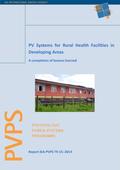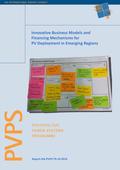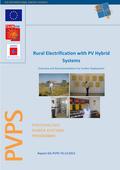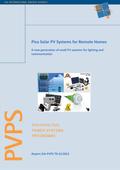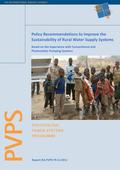Difference between revisions of "Deploying PV Systems for Regional Development - Publications"
***** (***** | *****) m |
***** (***** | *****) m |
||
| (8 intermediate revisions by the same user not shown) | |||
| Line 1: | Line 1: | ||
| − | |||
= Overview = | = Overview = | ||
| Line 14: | Line 13: | ||
= Innovative Business Models and Financing Mechanisms for PV Deployment in Emerging Regions = | = Innovative Business Models and Financing Mechanisms for PV Deployment in Emerging Regions = | ||
| − | [[File:Innovative Business Models and Financing Mechanisms for PV Deployment in Emerging Regions| | + | [[File:Innovative Business Models and Financing Mechanisms for PV Deployment in Emerging Regions.pdf|left|120px|Innovative Business Models and Financing Mechanisms for PV Deployment in Emerging Regions|alt=120px]] [[:file:Innovative Business Models and Financing Mechanisms for PV Deployment in Emerging Regions.pdf|This report]] intends to provide the reader with ideas about how the issue of financing could be addressed. Six case studies of innovative business models and financing mechanisms are presented, ranging from [[Features_of_PicoPV_Systems|pico-sized systems]] to large-scale PV plants including grid-connected as well as off-grid PV systems.<br/> |
The case studies illustrate that establishing a successful business model requires a thorough understanding of the specific regulatory, economic, social and cultural situation in the targeted region. | The case studies illustrate that establishing a successful business model requires a thorough understanding of the specific regulatory, economic, social and cultural situation in the targeted region. | ||
| + | |||
| + | = Rural Electrification with PV Hybrid Systems - Overview and Recommendations for Further Deployment = | ||
| + | |||
| + | [[File:Rural Electrification with PV Hybrid Systems - Overview and Recommendations for Further Deployment.pdf|border|right|120px|alt=Rural Electrification with PV Hybrid Systems - Overview and Recommendations for Further Deployment.pdf]] With decreasing PV prices, PV / diesel [[Portal:Mini-grid|hybrid mini-grids]] attract significant attention from institutions in charge of rural electrification and donor agencies - to mitigate fuel price increases, deliver operating cost reductions, and offer higher service quality than traditional single-source generation systems. The combining of technologies provides interesting opportunities to overcome certain technical limitations.[[:file:Rural Electrification with PV Hybrid Systems - Overview and Recommendations for Further Deployment.pdf|This publication]] aims to present the state of the art situation of PV / diesel hybrid systems for rural electrification and to highlight the main remaining issues – from the design, technical and implementation perspectives. | ||
| + | |||
| + | *Download the french version [http://www.iea-pvps.org/index.php?id=298 here]. | ||
| + | |||
| + | = Pico Solar PV Systems for Remote Homes - A New Generation of Small PV Systems for Lighting and Communication = | ||
| + | |||
| + | [[File:Pico Solar PV Systems for Remote Homes - A New Generation of Small PV Systems for Lighting and Communication.pdf|border|left|120pxpx|Pico Solar PV Systems for Remote Homes - A New Generation of Small PV Systems for Lighting and Communication|alt=Pico Solar PV Systems for Remote Homes - A New Generation of Small PV Systems for Lighting and Communication.pdf]] | ||
| + | |||
| + | A new generation of small PV systems for lighting and communication The concept of pico PV systems and their application in real-world circumstances are explained in [[:file:Pico Solar PV Systems for Remote Homes - A New Generation of Small PV Systems for Lighting and Communication.pdf|this publication]]. The importance of understanding the dynamics of the demand side of this market is clearly elaborated, as are the nature and supply of the products, their economics, and experience with various business models. There are clear lessons for the roles that should be played by governments, donor bodies and others in the markets for pico PV products and services, essentially as providers of appropriate institutional frameworks and information. | ||
| + | |||
| + | = Policy Recommendations to Improve the Sustainability of Rural Water Supply Systems = | ||
| + | |||
| + | [[File:Policy Recommendations to Improve the Sustainability of Rural Water Supply Systems.pdf|border|right|120px|alt=Policy Recommendations to Improve the Sustainability of Rural Water Supply Systems.pdf]] [[:file:Policy Recommendations to Improve the Sustainability of Rural Water Supply Systems.pdf|This publication]] outlines the various common problems experienced in rural water supply project implemented by experts from the water and sanitation sector and projects implemented by experts from the field of photovoltaic energy. It is desirable to promote closer collaboration and enhanced information exchange between the water sector and the renewable energy sector to benefit from the solutions already developed for the identified problems. Recommendations have been developed to improve the sustainability of rural water supply system projects and to support the institutional and planning frameworks involved in rural water supply programs. | ||
| + | |||
| + | = A User Guide to Simple Monitoring and Sustainable Operation of PV-diesel Hybrid Systems = | ||
| + | |||
| + | [[File:A User Guide to Simple Monitoring and Sustainable Operation of PV-diesel Hybrid Systems.pdf|border|left|120px|alt=A User Guide to Simple Monitoring and Sustainable Operation of PV-diesel Hybrid Systems.pdf]] [[:file:A User Guide to Simple Monitoring and Sustainable Operation of PV-diesel Hybrid Systems.pdf|This simple monitoring and evaluation guideline]] for PV-diesel hybrid systems allows operators to understand if their system is operated in a way that ensures long lifetime (e.g. extending the battery lifetime for several years). It gives suggestions on how to act if there are signs of unfavourable use or failure. | ||
<br/> | <br/> | ||
| Line 24: | Line 43: | ||
*[[Energy for Rural Health Centers|Energy for Rural Health Centers]] | *[[Energy for Rural Health Centers|Energy for Rural Health Centers]] | ||
*[[:File:GIZ HERA Energy for Rural Health Centers (EN).pdf|GIZ HERA: Energy for Rural Health Centers]] | *[[:File:GIZ HERA Energy for Rural Health Centers (EN).pdf|GIZ HERA: Energy for Rural Health Centers]] | ||
| − | *[[:Category: | + | *[[:Category:Financing Solar|Articles on Financing solar projects]] |
*[[Portal:Solar|Solar portal on energypedia]]<br/> | *[[Portal:Solar|Solar portal on energypedia]]<br/> | ||
| Line 31: | Line 50: | ||
This publication is part of the activities under Task 9 and for a full list of reports please refer to [http://iea-pvps.org/index.php?id=task9 http://iea-pvps.org/index.php?id=task9] or contact the Operating Agents [mailto:hedi.feibel@skat.ch hedi.feibel@skat.ch] [mailto:stefan.kessler@infras.ch stefan.kessler@infras.ch] | This publication is part of the activities under Task 9 and for a full list of reports please refer to [http://iea-pvps.org/index.php?id=task9 http://iea-pvps.org/index.php?id=task9] or contact the Operating Agents [mailto:hedi.feibel@skat.ch hedi.feibel@skat.ch] [mailto:stefan.kessler@infras.ch stefan.kessler@infras.ch] | ||
| + | [[Category:Energy_Access]] | ||
| + | [[Category:Impacts_Health]] | ||
| + | [[Category:Financing_and_Funding]] | ||
| + | [[Category:PicoPV]] | ||
| + | [[Category:Rural_Development]] | ||
| + | [[Category:Hybrid_Systems]] | ||
| + | [[Category:Rural_Electrification]] | ||
| + | [[Category:Monitoring]] | ||
| + | [[Category:Publication]] | ||
| + | [[Category:Solar]] | ||
[[Category:Photovoltaic_(PV)]] | [[Category:Photovoltaic_(PV)]] | ||
| − | [[Category: | + | [[Category:PV_Mini-grid]] |
| − | |||
| − | |||
| − | |||
Latest revision as of 14:22, 6 February 2017
Overview
This article includes a series of publications that focus on topics related to PV deployment for regional development.
PV Systems for Rural Health Facilities in Developing Areas
This report outlines a technical overview towards deployment of PV systems for rural health facilities in developing areas. The demand and supply of energy in health facilities is analyzed, and international standards are presented. Technical and economic aspects of different power generation options are also discussed.
According to the report, regulatory frameworks, institutional frameworks and business models are the main frameworks for a successful PV supply program for health facilities. Similarly, lessons learnt from past projects show that the sustainability of PV systems also require one to consider the technological aspects, capacity building, operation and maintenance.
Innovative Business Models and Financing Mechanisms for PV Deployment in Emerging Regions
This report intends to provide the reader with ideas about how the issue of financing could be addressed. Six case studies of innovative business models and financing mechanisms are presented, ranging from pico-sized systems to large-scale PV plants including grid-connected as well as off-grid PV systems.
The case studies illustrate that establishing a successful business model requires a thorough understanding of the specific regulatory, economic, social and cultural situation in the targeted region.
Rural Electrification with PV Hybrid Systems - Overview and Recommendations for Further Deployment
With decreasing PV prices, PV / diesel hybrid mini-grids attract significant attention from institutions in charge of rural electrification and donor agencies - to mitigate fuel price increases, deliver operating cost reductions, and offer higher service quality than traditional single-source generation systems. The combining of technologies provides interesting opportunities to overcome certain technical limitations.This publication aims to present the state of the art situation of PV / diesel hybrid systems for rural electrification and to highlight the main remaining issues – from the design, technical and implementation perspectives.
- Download the french version here.
Pico Solar PV Systems for Remote Homes - A New Generation of Small PV Systems for Lighting and Communication
A new generation of small PV systems for lighting and communication The concept of pico PV systems and their application in real-world circumstances are explained in this publication. The importance of understanding the dynamics of the demand side of this market is clearly elaborated, as are the nature and supply of the products, their economics, and experience with various business models. There are clear lessons for the roles that should be played by governments, donor bodies and others in the markets for pico PV products and services, essentially as providers of appropriate institutional frameworks and information.
Policy Recommendations to Improve the Sustainability of Rural Water Supply Systems
This publication outlines the various common problems experienced in rural water supply project implemented by experts from the water and sanitation sector and projects implemented by experts from the field of photovoltaic energy. It is desirable to promote closer collaboration and enhanced information exchange between the water sector and the renewable energy sector to benefit from the solutions already developed for the identified problems. Recommendations have been developed to improve the sustainability of rural water supply system projects and to support the institutional and planning frameworks involved in rural water supply programs.
A User Guide to Simple Monitoring and Sustainable Operation of PV-diesel Hybrid Systems
This simple monitoring and evaluation guideline for PV-diesel hybrid systems allows operators to understand if their system is operated in a way that ensures long lifetime (e.g. extending the battery lifetime for several years). It gives suggestions on how to act if there are signs of unfavourable use or failure.
Further Information
- Energy for Rural Health Centers
- GIZ HERA: Energy for Rural Health Centers
- Articles on Financing solar projects
- Solar portal on energypedia
References
This publication is part of the activities under Task 9 and for a full list of reports please refer to http://iea-pvps.org/index.php?id=task9 or contact the Operating Agents hedi.feibel@skat.ch stefan.kessler@infras.ch

